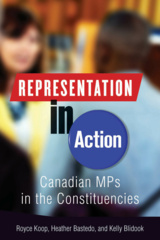
The Liberal Party has fallen on hard times since 2006. Once Canada’s natural governing party but now confined to the opposition benches, it struggles to renew itself – presumably without the support of the provincial-level Liberal parties.
Based on personal observations in cross-country ridings and interviews with grassroots activists, Grassroots Liberals reveals that Liberals are negotiating the limitations and possibilities of federalism and multi-level politics, on the one hand, and distinct, geographically defined constituencies for provincial and federal politics, on the other. Their efforts call into question the idea that Canada has two distinct political spheres – the provincial and the national. Although the Liberal Party, like other parties, disassociated itself from its provincial cousins to rebuild itself in the mid-twentieth century, grassroots Liberals and other partisans in the constituencies continue to build political ties that encompass both national and provincial politics.
This insider’s view of Liberal party politics in Canada suggests that national parties can overcome the challenge of multi-level politics, strengthen their ties to provincial politics, and deepen their legitimacy by tapping the activism, energy, and support of constituency associations and local campaigns.
The book will be of interest to students and scholars of political parties and multi-level politics and to politicians, policy makers, and political enthusiasts who want a deeper understanding of Canadian politics and the “big red machine.”
Awards
- , Commended - The Hill Times List of Top 100 Best Books for 2012
- 2014, Winner - Seymour Martin Lipset Best Book Award, American Political Science Association
Too often the study of politics is remote from the experiences of those who are engaged in it. Grassroots Liberals is an important corrective to this tendency and Koop is to be commended for taking the activities and insights of those who make their parties work at the local level seriously.
Koop makes a compelling case that local diversity is an unavoidable feature of a ‘big tent’ entity such as the Liberal Party of Canada.
Any student doing advanced work on the Canadian party system will need to read Grassroots Liberals. In an age when electoral analysts focus on the electronic and plebiscitary character of campaigns, this book is a powerful message to political scientists that the building blocks of party life are situated in electoral districts.
An interesting and unusual treatment of Canada’s natural governing party. Koop’s ethnographic approach, relying heavily on interviews with party officials and focusing on the nature of their locally conditioned interactions across federal and provincial levels, is revealing of a complex set of interrelationships that have not been appreciated in the literature on political parties. The result is a far more nuanced understanding of the nature of Canadian political life.
Royce Koop is an assistant professor in the Department of Political Studies at the University of Manitoba.
Introduction
1 Multi-Level Politics and the Liberal Party
2 Grassroots Party Activists
3 Constituency Associations: Organization and Party Life in the Ridings
4 Local Campaigns and Grassroots Armies
5 Small Worlds: The Riding Context
6 Little Fiefdoms: MPs, MLAs, and Their Local Organizations
7 Conclusion: The Local Political Worlds of the Liberal Party
Appendices
References










